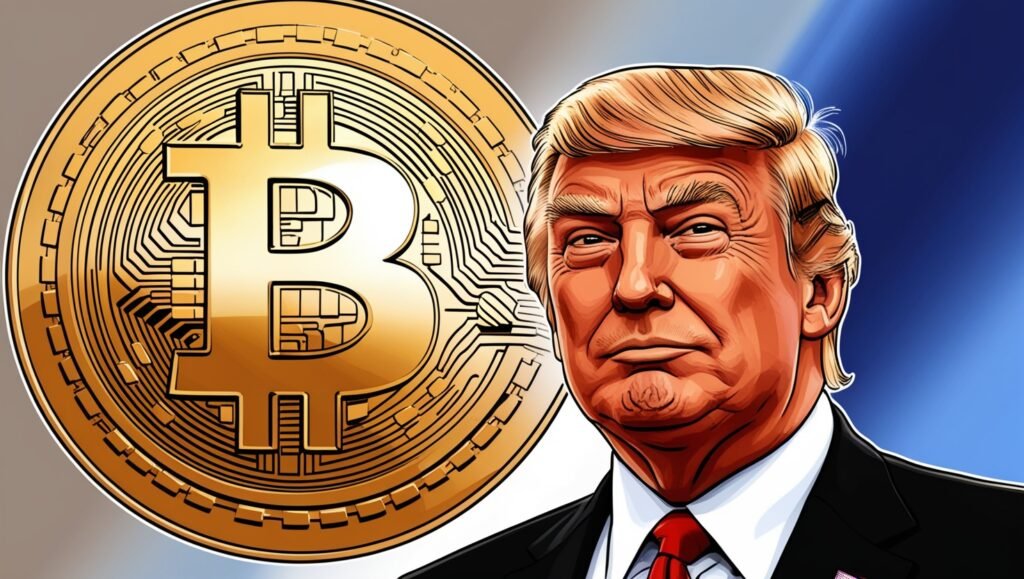
The New Political Landscape
The recent election victory of Donald Trump has ushered in a new political landscape with far-reaching implications across various sectors, particularly within the realm of finance and cryptocurrency. As Trump assumes office, his administration is poised to influence numerous policies that intersect with the burgeoning crypto market. Historically, political events have shown a significant correlation with financial markets, and the cryptocurrency space is no exception. With Bitcoin, Ethereum, and other cryptocurrencies witnessing heightened volatility in response to political changes, the implications of Trump’s policies could reshape the market dynamics substantially.
Donald Trump’s approach to regulation, economic recovery strategies, and international trade agreements may profoundly affect the cryptocurrency industry. Investors and market observers are particularly keen to understand how Trump on crypto will unfold, as his stance on digital assets could either bolster or hinder the growth trajectory of this innovative asset class. Financial markets often react sharply to political uncertainty, and a shift in leadership can lead to nuanced shifts in investor sentiment, influencing their willingness to engage with cryptocurrencies like Bitcoin.
Moreover, Trump’s vocal support or skepticism about Bitcoin could galvanize a surge in interest or trigger caution among investors. As the world is increasingly recognizing the potential of cryptocurrencies and blockchain technology, the upcoming months will be pivotal in determining how the political climate under Trump’s leadership will shape the future of crypto investments, particularly in relation to Bitcoin and their broader acceptance. Observers should prepare for a scenario where Trump crypto narratives could dominate headlines, influencing decision-making processes of investors and the direction of the market.
Historical Context: Trump and Crypto
During Donald Trump’s first term as President of the United States, his approach to cryptocurrency and blockchain technology was notably cautious. In 2018, he made headlines when he declared his disapproval of Bitcoin and other cryptocurrencies, emphasizing that they posed a threat to the stability of traditional financial systems. Trump asserted that cryptocurrencies were not backed by any tangible asset and indicated that they could facilitate illegal activities, including drug trafficking and money laundering. His skepticism towards the decentralized nature of digital currencies was evident, as he often emphasized the need for regulation and oversight in financial markets.
Under his administration, the regulatory landscape for cryptocurrencies witnessed a mixed response. While Trump did not implement any outright bans on digital currencies, his administration’s approach was largely characterized by a call for stricter regulatory frameworks. The Financial Crimes Enforcement Network (FinCEN), operating under the Treasury Department, advanced regulatory measures that increased reporting requirements for cryptocurrency exchanges and other service providers. This regulatory stance aimed to combat illicit activities but also fostered uncertainty for investors and developers within the crypto space.
Furthermore, Trump’s policies, particularly concerning trade and taxes, created a climate of volatility that affected financial markets, including cryptocurrencies. The tariffs imposed on several countries and shifting fiscal strategies contributed to an environment ripe for speculation, which can often drive interest in digital assets like Bitcoin. Trump’s influence on overall market sentiment may have had implications for Bitcoin’s price movements during this period.
As Donald Trump approaches a potential second term, understanding his previous interactions with cryptocurrency is crucial. His early skepticism and regulatory initiatives may shape his administration’s approach to the crypto future, influencing how Bitcoin and other digital currencies evolve in the coming months. This historical context sets the stage for assessing the potential impacts of Trump’s policies on the cryptocurrency market in the light of his anticipated return to the political forefront.
Initial Impact on Bitcoin Prices
Donald Trump’s election victory in November 2016 marked a pivotal moment for various financial markets, including the cryptocurrency sector. Among the cryptos that typically respond to significant political events, Bitcoin is often at the forefront of price fluctuations. In the days leading up to and following Trump’s election win, Bitcoin experienced immediate volatility. Initial reactions saw a sharp decrease in its price, followed by a rapid recovery, illustrating the complex relationship between political events and market performance.
Historical data indicates that unexpected election outcomes can lead to increased uncertainty in traditional and crypto markets alike. Following Trump’s election, Bitcoin fell from around $700 to approximately $600 within hours, reflecting a market hesitant to embrace changes brought on by the new administration. However, this trend reversed quickly, and Bitcoin’s price began to surge as confidence in the potential of blockchain technology grew, aligning with Trump’s focus on innovation and economic growth.
Moreover, the initial weeks following the election demonstrated a notable upward trajectory for Bitcoin. As Trump promised regulatory reform and a pro-business environment, many investors began to shift their attention towards digital currencies. The focus shifted not only to Bitcoin but also to altcoins, resulting in a broader positive outlook for the cryptocurrency market. Such developments can be considered a contributor to the burgeoning interest in Trump’s policies related to technology and finance, irrespective of specific Trump crypto rhetoric at the time.
This volatility illustrates the mixed sentiments prevalent among investors during major political shifts. It is important to analyze future trends as Donald Trump continues to influence discourse around cryptocurrency and its regulatory future. Understanding these initial responses can provide valuable insights into how similar political events may shape the cryptocurrency market.
Regulatory Changes
As the cryptocurrency landscape continues to evolve, the leadership of Donald Trump is poised to instigate significant regulatory changes that could reshape the entire sector. Under Trump’s administration, we can expect a mix of policies that could either stimulate or hinder the growth of cryptocurrencies such as Bitcoin. Historically, Trump’s approach to regulation has leaned towards deregulation, which may suggest a favorable environment for cryptocurrencies. However, his stance could also pose challenges as he navigates regulatory frameworks that prioritize national security and economic interests.
Initially, one potential area of regulatory change could involve the clarification of the legal status of cryptocurrencies. Trump’s administration might push to define cryptocurrencies more clearly, which could eliminate uncertainties currently faced by investors and businesses dealing with Bitcoin and other digital currencies. Such clarity may enhance market confidence and encourage greater participation in the crypto space. Furthermore, should Trump endorse policies that foster innovation, we could anticipate a more conducive regulatory framework that promotes the growth of the cryptocurrency market.
Conversely, the geopolitical landscape, especially in light of inflationary pressures and economic competition, may lead to tighter regulations on cryptocurrencies. Trump’s focus on protecting American economic interests could result in significant scrutiny of international crypto transactions and ICOs (initial coin offerings). This focus could create a regulatory environment that restricts certain crypto activities, impacting Trump on crypto investments and initiatives. Crypto advocates may need to remain vigilant as they monitor potential legislation aimed at curbing money laundering and fraud associated with digital currencies.
In conclusion, the regulatory changes anticipated under Trump’s leadership could play a crucial role in determining the future dynamics of the cryptocurrency market. Market participants will need to stay informed about these developments to adapt their strategies effectively in this rapidly changing environment.
Increased Interest in Cryptocurrencies
The election of Donald Trump has had far-reaching implications across various sectors, including the cryptocurrency market. As we analyze the potential impact of Trump’s policies and attitudes towards digital currencies, it is essential to consider how these factors may shape investment trends in Bitcoin and altcoins. Historically, political changes have influenced financial markets, and the rise of Trump has already begun to foster an increased interest in crypto assets.
Trump’s administration has been characterized by an inclination towards innovative technologies and a deregulated economic environment. This has led many traditional investors to reassess their stance on alternative assets, such as cryptocurrencies. With a focus on economic growth, investors may see Trump on crypto as a catalyst to diversify their portfolios by exploring the potential of Bitcoin and other digital currencies. This shift in perception could usher in a new era where cryptocurrencies are no longer viewed solely as speculative assets, but rather as viable components of a balanced investment strategy.
Moreover, Trump’s active engagement with financial markets and his tendency to communicate directly with the public through social media platforms create a landscape ripe for increased awareness and interest in cryptocurrencies. As investors become more attuned to the benefits of blockchain technology and the possibility of decentralized finance, this could lead to an uptick in both institutional and retail investment in Bitcoin and altcoins.
In this context, the crypto future appears promising. If Trump’s policies continue to foster a favorable environment for digital asset adoption, we may observe a sustained trend of increased interest in cryptocurrencies. Consequently, investors should closely monitor developments related to Trump’s stance on crypto, as these will undoubtedly influence market dynamics and investment behaviors in the coming months.
International Reactions to Trump’s Victory
The election of Donald Trump has reverberated across numerous sectors, with cryptocurrency being a particularly prominent area of interest. Following Trump’s victory, a variety of international reactions emerged, highlighting widespread speculation about changes in crypto regulation and market dynamics. Countries that previously took a cautious stance on digital currencies are now re-evaluating their policies in light of new leadership in the United States, especially regarding Trump on crypto regulation.
For many nations, the approach the Trump administration will adopt towards cryptocurrencies could serve as a blueprint for their own policies. Countries such as China and the European Union, known for their stringent regulations on digital currencies, may soften their stances to align themselves with potentially more lenient U.S. polices. Consequently, Trump bitcoin’s future may influence the regulatory landscape in these regions, prompting discussions around compliance, taxation, and anti-money laundering protocols that are essential to growing crypto markets.
Moreover, emerging markets are viewing Trump’s victory as an opportunity to either adopt or bolster their respective cryptocurrency initiatives. In Latin America, for instance, nations like Brazil and Argentina could leverage changes in U.S. crypto policy to increase Bitcoin adoption as a hedge against inflation and economic uncertainty. The astute observation of Trump’s approach towards cryptocurrencies might lead other governments to facilitate clearer regulations, thus enhancing mainstream adoption of Bitcoin and other forms of crypto.
These shifts could lead to unprecedented changes in global attitudes toward cryptocurrencies, placing them at the forefront of financial discussions. Countries may adopt a more collaborative approach, sharing knowledge and establishing frameworks that foster cryptocurrency innovation. This evolving dynamic could culminate in a more interconnected global crypto market, driven in part by the actions of the Trump administration and its engagement with digital assets.
Crypto Development Trends
As the cryptocurrency landscape evolves, the influence of political leadership is becoming increasingly evident. With Donald Trump’s election victory, there is an opportunity for significant changes in the regulatory environment surrounding cryptocurrencies. Trump’s administration may prioritize technological innovation, thereby creating a more favorable climate for developments in blockchain technology and digital currencies like Bitcoin. The potential policies he advocates could either accelerate or decelerate the advancement of these technologies, impacting the overall trajectory of the crypto market.
Historically, the U.S. regulatory environment has played a critical role in shaping the cryptocurrency space. Trump’s stance on crypto could either enhance or restrict entrepreneurial initiatives. If his administration fosters a regulatory framework that encourages innovation, American businesses may thrive, potentially positioning the United States at the forefront of blockchain development. This can catalyze growth within the sector and provide a conducive environment for startups dedicated to creating disruptive technologies.
Moreover, Trump on crypto is closely tied to the broader context of financial technology advancements. If Trump’s administration supports initiatives that prioritize research and development in blockchain technology, the U.S. might witness a surge in innovative applications of cryptocurrencies. This would encourage collaboration between the government and private sector, fostering an entrepreneurial environment that could lead to groundbreaking advancements in crypto and related technologies.
Conversely, if there is a heavy-handed approach to regulation, there may be stifling effects on innovation within the blockchain space. Entrepreneurs and companies might be deterred from fully engaging with cryptocurrencies due to uncertainty or restrictive policies. Therefore, understanding the implications of Trump’s policies on crypto is essential for forecasting the future of Bitcoin and the broader cryptocurrency market. Developing technologies that could thrive or dwindle post-election, depending on the tenor of governmental support, will shape the operational landscape in the coming months significantly.
What to Expect in the Next Few Months
The cryptocurrency market, particularly Bitcoin, has shown significant volatility influenced by various factors, including political dynamics. With Donald Trump’s election victory, speculations surrounding his stance on crypto are prevalent. Given his previous comments, many in the crypto community are keenly observing how Trump on crypto may influence regulatory policies and market sentiment. Optimistically, Trump’s administration could favor reduced regulation, which might entice institutional investments into Bitcoin, thereby driving prices up. This scenario could unlock new opportunities for technological advancements and stimulate further adoption of cryptocurrencies as mainstream financial assets.
On the flip side, there are potential risks associated with a Trump presidency that could threaten the crypto landscape. Trump’s traditionally cautious approach towards financial oversight may foster an environment of uncertainty. If he were to implement stringent regulations that restrict trading or foster distrust in cryptocurrencies, it could have the counterproductive effect of suppressing market growth. Such a scenario could lead to a decline in investment sentiment, pushing prices down and causing market destabilization.
In conclusion, the ensuing months following Trump’s election victory will likely see a complex interplay of factors influencing the cryptocurrency market. Regardless of whether the outlook is optimistic or pessimistic, it is clear that Trump’s policies will play a significant role in shaping the future of Bitcoin and the broader crypto ecosystem.
Embracing Change in the Crypto Market
The intersection of politics and cryptocurrency is increasingly important, especially in light of Donald Trump’s influence on the market. As the former president has navigated through significant policy decisions and statements regarding cryptocurrencies, his stance on issues like Bitcoin continues to resonate deeply with investors and enthusiasts alike. The announcement of his views, or even speculation around them, often leads to considerable fluctuations in the value of various cryptocurrencies, including bitcoin. Understanding these dynamics is crucial for anyone looking to engage with the crypto market.
As we have discussed, Trump’s perspective on crypto and the regulatory framework he promotes can significantly shape the future of digital assets. With an administration that has shown mixed sentiments on crypto regulation, there remains a certain unpredictability in how these policies will evolve. This unpredictability reinforces the necessity for cryptocurrency investors to remain informed about the political landscape and its implications. Furthermore, as Trump’s potential return to political office looms on the horizon, his future statements regarding currencies like bitcoin could either support or hinder market progression.
In this ever-evolving landscape, adaptability has become a cornerstone for success in the cryptocurrency arena. Investors must continuously evaluate how shifting political currents impact their assets, including the perception of crypto as an investment and the regulatory pressures that may unfold. Staying updated on Trump crypto developments and the broader implications for the crypto market will be essential for both seasoned and novice investors alike. Thus, embracing change and maintaining a vigilant approach to market fluctuations rooted in political influences will empower investors to make informed decisions as the future unfolds.











